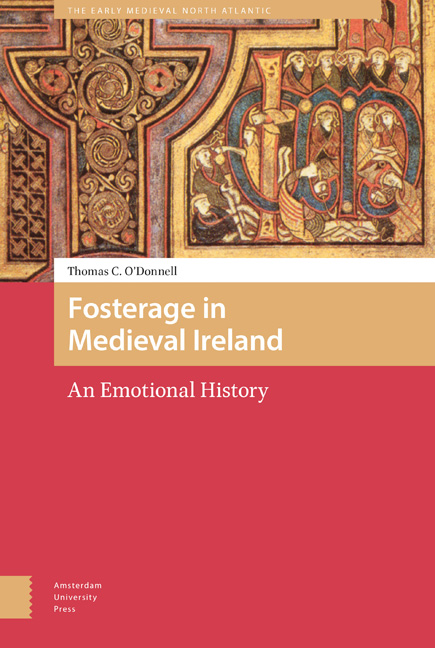Book contents
- Frontmatter
- Dedication
- Contents
- Abbreviations
- Acknowledgements
- Introduction
- 1 Cú Chulainn and Expressions of Foster Fatherhood
- 2 Who Makes a Foster Sibling?
- 3 Identity within Fosterage
- 4 Fosterage in the Medieval Irish Church
- 5 Animal Fosterage: A Bestial Parallel?
- Conclusion
- Bibliography
- About the Author
- Index
- Frontmatter
- Dedication
- Contents
- Abbreviations
- Acknowledgements
- Introduction
- 1 Cú Chulainn and Expressions of Foster Fatherhood
- 2 Who Makes a Foster Sibling?
- 3 Identity within Fosterage
- 4 Fosterage in the Medieval Irish Church
- 5 Animal Fosterage: A Bestial Parallel?
- Conclusion
- Bibliography
- About the Author
- Index
Summary
Abstract
In this Introduction the case is made for using the narrative literature of the medieval period to access the emotional lives of foster families in medieval Ireland. Foster families in this context are those formed when freeborn families send their children – often at a very young age – to another family to be raised and educated until the child entered its late teens. The early exposure and continued association between foster parents and siblings to these children created close and lasting emotional ties. The current study will examine those emotional ties by critically engaging with the language used around fosterage and the assumptions that underpin the relationship, as expressed in narratives, to trace the emotional ties of medieval Irish fosterage.
Keywords: history of emotions; medieval Ireland; fosterage; affect; children; fictive families
The twelfth-century tale known as the Bóroma (The Tribute) begins by describing the ill-fated lives of the daughters of Tuathal Techtmar, high-king of Ireland. The eldest, Fithir, is described as the ‘beloved foster daughter’ (dalta dil), of the king of Connacht. The youngest, Dárine, was fostered by the king of the Ulaid. When they both die of grief and shame caused by the duplicitous actions of their husband, the king of Leinster, both foster fathers muster their armies, march to the border and, according to ‘the men of Connacht’, the foster fathers ‘would not go from Leinster without battle. The Ulaid said the same.’ This kicks off the action of the Bóroma itself. But what did the love that the king of Connacht expressed for his foster daughter mean? Was the anger that the two foster fathers felt on behalf of their slain foster children justified? What experience in the mind of the contemporary audience was that relationship speaking to? Was there any social reflection of these emotions within fosterage at all? These are the questions this book seeks to answer.
It is often stated that fosterage was used to create strong emotional bonds between the members of a given foster family. Such an observation is made in modern secondary literature, for example, Preston-Matto likens fosterage to marriage ties: ‘[F]osterage served as a way to strengthen or re-establish ties between families, or even, perhaps a way to forestall military issues between families much in the same way that marriages were meant to work.’
- Type
- Chapter
- Information
- Fosterage in Medieval IrelandAn Emotional History, pp. 13 - 34Publisher: Amsterdam University PressPrint publication year: 2020



